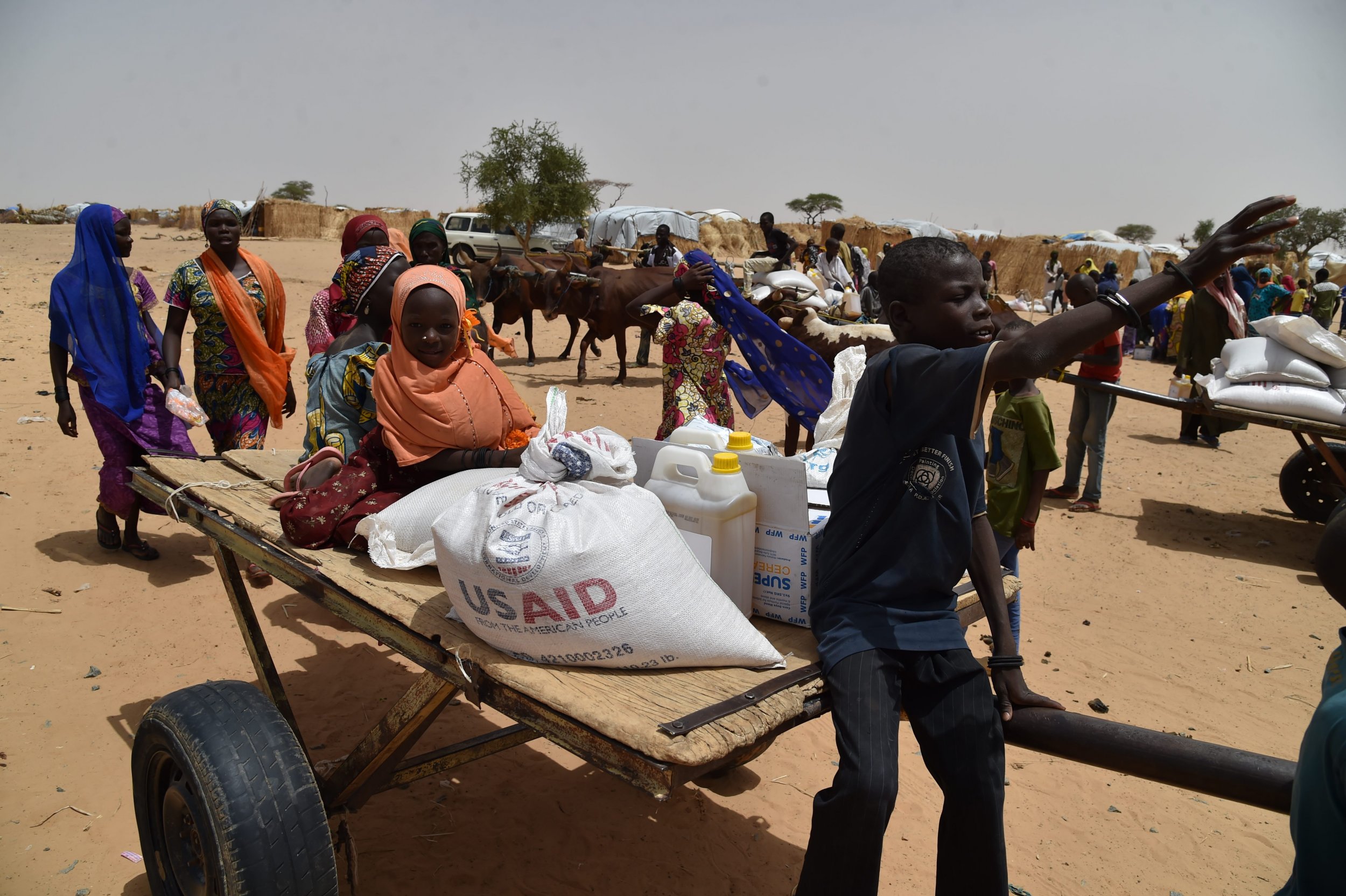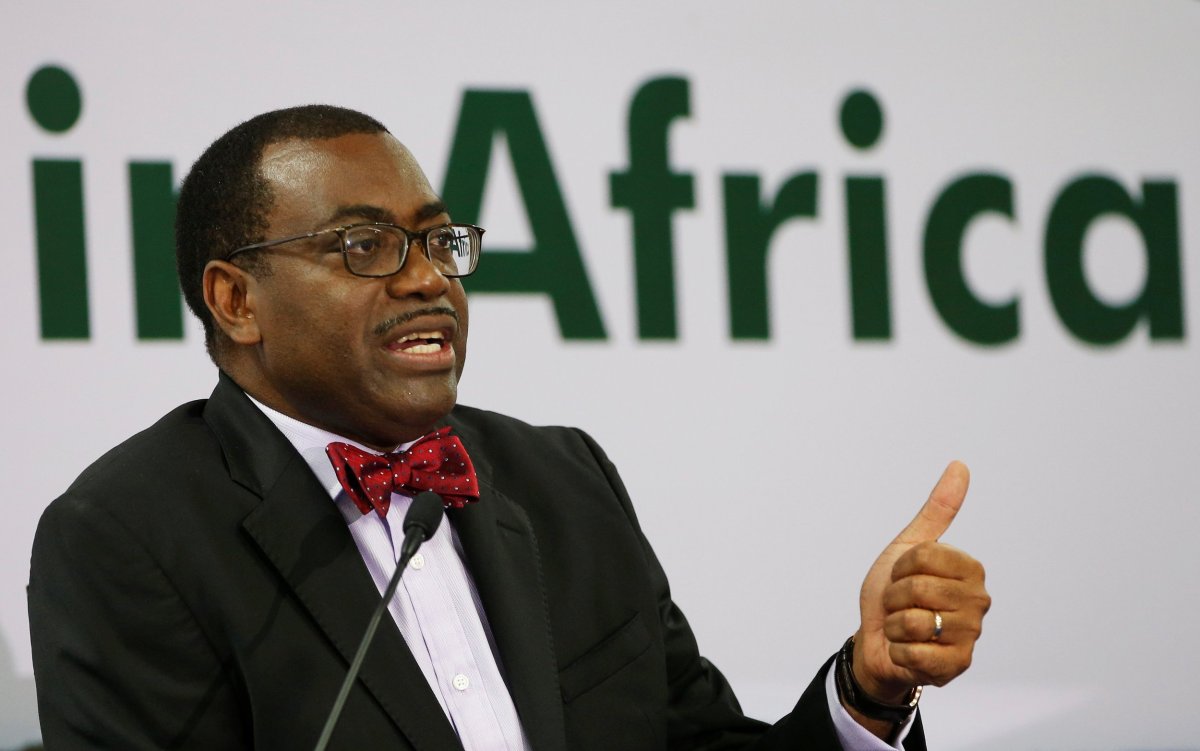
Update | Cutting U.S. foreign aid to Africa could turn the continent into "a recruiting field for terrorists," the head of the African Development Bank (AfDB) tells Newsweek .
Akinwumi Adesina, the president of the 78-member AfDB — Africa's version of the World Bank — says that cash from Washington plays a vital role in creating jobs in rural parts of Africa, where young people may otherwise turn to extremism when faced with unemployment and poverty due to environmental issues or conflict.
U.S. President Donald Trump outlined his economic vision for America with a "skinny budget" proposal in March, which envisioned cutting resources for the Department of State and USAID—the U.S. government's main disbursers of foreign aid—by 28 percent, partially to fund a $52 billion increase in military spending. The full budget is due to be unveiled on Tuesday.
Africa is the biggest regional recipient of U.S. foreign aid, drawing 32 percent of the total spent in the 2015 fiscal year. USAID and the Department of State gave more than $8 billion assistance to 47 countries in sub-Saharan Africa that year, which was spent on issues including security, fighting disease and nutrition.
A total $717 million was spent on response to the Ebola epidemic, which claimed more than 11,000 lives across West Africa.
"Everywhere you go where you have what I call a triangle of disaster—anywhere [where] you have high levels of extreme poverty, rural poverty in particular; high levels of unemployment in rural areas; and where you have environmental and climate degradation, you always have terrorists operating," says Adesina, speaking to Newsweek from Ahmedabad, India, where the AfDB is holding meetings to improve cooperation between the host country and Africa.
"Where you cannot create economic opportunities, these rural areas all across Africa where agriculture ought to be working will simply become a recruiting field for terrorists. I'm sure that's not in the interests of the United States nor any other country."
Several regions of Africa are blighted by Islamist terrorist groups: Al-Shabab in Somalia and Boko Haram in Nigeria and the Lake Chad region are both waging insurgencies, while multiple Al-Qaeda-linked groups are active in and around Mali.
In a recent address to Department of State employees, Secretary of State Rex Tillerson said that the administration's main priority in Africa was national security and fighting militancy. "We cannot let Africa become the next breeding ground for a re-emergence of a caliphate for ISIS," said Tillerson, referring to the Islamic State militant group (ISIS).
Read more: State Department deputy says U.S. troops won't be on the frontline in Somalia
Adesina says that the AfDB itself has committed $24 billion over the next decade to agriculture in Africa, aiming at industrializing the sector, creating more jobs and making Africa self-sufficient in terms of food production. But he says that the continent needs the continued support of the United States and others.
In particular, Africa needs international backing to deal with the impact of climate change ; Adesina says that the continent is "suffering disproportionately" from the negative impact of global warming, despite the fact it "didn't really contribute much at all" to harmful emissions.
In 2013, sub-Saharan Africa emitted 735.1 metric tonnes of carbon dioxide—a seventh of what the United States produced ( 5,136.35 metric tonnes ). Yet the continent is predicted to be one of the hardest-hit by climate change, and Africa is already the home of three out of four countries at-risk of famine —Kenya, Somalia and South Sudan— where, along with Yemen, 20 million people face starvation.

Experts say that climate change has played a significant role in each country, though conflicts have also contributed to lack of food and stunted agriculture.
"Africa needs a lot more resources to be able to create jobs, support the revitalization of rural areas, and to adapt to climate change, because if we don't then the negative externalities on this for the world are going to be massive," says Adesina. "So cutting aid is not the way to go, it's providing aid in the right way to allow these rural economies to grow and create massive amounts of jobs for young people."
The Trump administration is yet to elaborate significantly on its policy towards Africa and the top Africa position in the Department of State, the assistant secretary for African affairs, remains vacant. Trump did host Egyptian President Abdel Fattah el-Sissi at the White House in April and has indicated a desire to visit the North African country, but Egypt is classified as part of the Near East, not Africa, according to U.S. diplomatic policy.
Trump's budget proposal would also entail the closure of several government agencies, including the U.S. African Development Foundation, which invested $53 million in projects across 30 African countries in 2016. But the budget outline would also maintain all current commitments to the U.S. government's program to treat HIV/AIDS in Africa— known as PEPFAR and which provides life-saving treatment for 11.5 million people—and secure U.S. contributions to a global fund fighting AIDS, tuberculosis and malaria.
The proposal also envisioned a reduction in U.S. funding to U.N. peacekeeping operations, many of which are based in Africa. Washington currently contributes 28.57 percent of the annual $7.87 billion peacekeeping budget; the Trump administration wants to reduce this to a maximum of 25 percent.
Africa is home to nine of the 16 active U.N. peacekeeping operations. In some fragile states, such as Central African Republic, U.N. blue helmets are the only effective means of providing security to vulnerable civilian populations.
This article originally misspelled Akinwumi Adesina's first name. It is Akinwumi, not Akinwunmi.
Uncommon Knowledge
Newsweek is committed to challenging conventional wisdom and finding connections in the search for common ground.
Newsweek is committed to challenging conventional wisdom and finding connections in the search for common ground.
About the writer
Conor is a staff writer for Newsweek covering Africa, with a focus on Nigeria, security and conflict.
To read how Newsweek uses AI as a newsroom tool, Click here.








